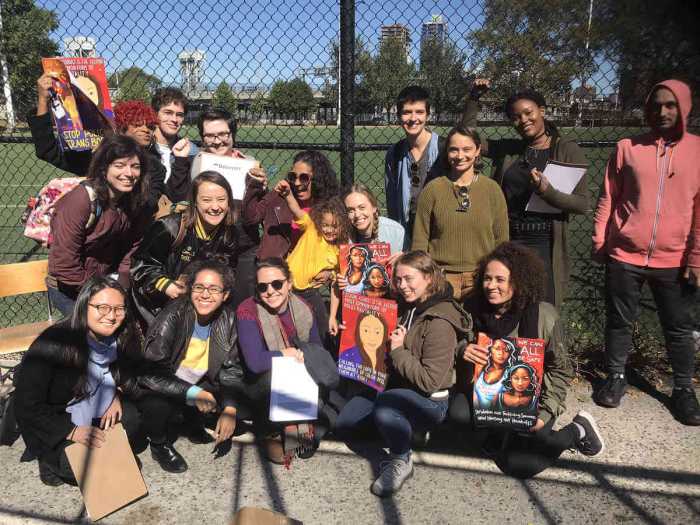Toward the end of a more than hour-long panel discussion at the #Rentboy Raid town hall, Mitchyll Mora, the moderator, asked the three panelists to comment on the August 25 raid that shut down the male escort website and resulted in the arrests of its seven employees for violating the federal Travel Act.
“Basically, for me, it means privilege,” said Monica Jones, who was representing the Best Practices Policy Project, a group that advocates for sex workers. “It comes from the white cis gay privilege.”
The November 11 event, which was held at the Lesbian, Gay, Bisexual & Transgender Community Center, was intended to leverage the national attention that the raid received and bring focus to the concerns of a broader population of sex workers, including women and transgender people.
Race is key to police action say panelists, with some arguing website shutdown a “white cis gay privilege” concern
The subhead on the town hall was “The #Rentboy Raid Is Every Day” so Jones’ posture was not a complete surprise. Still, it was not at all clear how dismissing the experience of the seven employees, who face up to five years in prison, and the thousands of escorts, who saw their livelihood impaired or perhaps even ended when rentboy.com was shut down, will expand any conversation about sex work.
A second panelist was equally unsympathetic.
“It happens to us every day,” said Jenna Torres, an organizer at the Red Umbrella Project, which also advocates for sex workers.
Brendan Conner, the third panelist and a former rentboy.com advertiser, did represent the views of the escorts on that site and discuss his conversations with some of the escorts as a staff member at Streetwise and Safe, a youth advocacy group.
Mora, who is also on staff at Streetwise and Safe, and Conner were the primary organizers of the town hall, but under the rubric of the #HookUp Collaborative, an adhoc group that formed after the rentboy.com raid, and not as staff from Streetwise and Safe. The town hall was endorsed by ACT UP New York, which launched the gofundme.com page to pay expenses for the event at Conner’s request.
The panelists and Mora were effective in advocating for their own views and experience. All the participants were former sex workers who have since left the business, but continue to work on behalf of sex workers. They shared a pronounced pessimism about efforts by government to aid sex workers, notably the Human Trafficking Intervention Courts (HTIC), which began in New York in 2013. Each borough in the city has an HTIC court and there are others in six counties outside the city.
Some advocates for sex workers have rejected these courts saying they treat victims like criminals by bringing them into court in handcuffs and then requiring that they participate in counseling or job programs under the threat of being rearrested if they miss appointments. Participants who comply with the mandated programs get their prostitution arrests dismissed.
“They need money, they need housing, they need jobs,” Torres said. “They need stability in their lives… Sex work isn’t an illness. It’s not a moral issue. It’s economic.”
The panelists shared the view that the prostitution arrests were akin to the police department’s use of stop and frisk. The data on stop and frisk shows that police overwhelmingly targeted young African-American and Latino men. Similarly, the panelists argued that police target African-American women and transgender women for prostitution arrests. In his opening remarks, Mora likened the criminal justice response to prostitution to slavery and the “forced removal of indigenous people” in that it is “designed to police our bodies.”
One striking point in the evening was the discussion about legalization of sex work versus the decriminalization of sex work. Legalization was opposed by the panelists. Decriminalization was their preference, because with legalization comes government regulation of the industry that could result in many current sex workers being barred from the work.
“The word decriminalization is meant to be expansive,” Jones said. “Legalization often comes with its own exclusionary policies.”
Torres shared that view saying, “What ultimately we need to do is decriminalize sex work. That’s what needs to happen… I think legalization is about privilege.”
Roughly 75 people attended the event, and about 30 stayed to discuss possible solutions in two small groups.




































